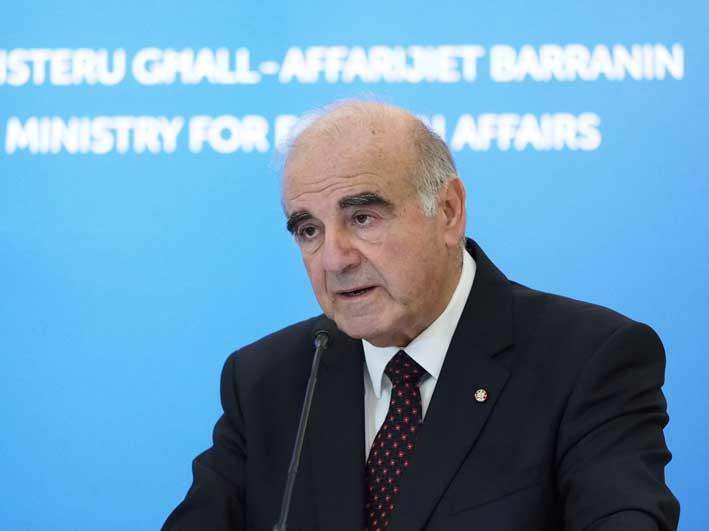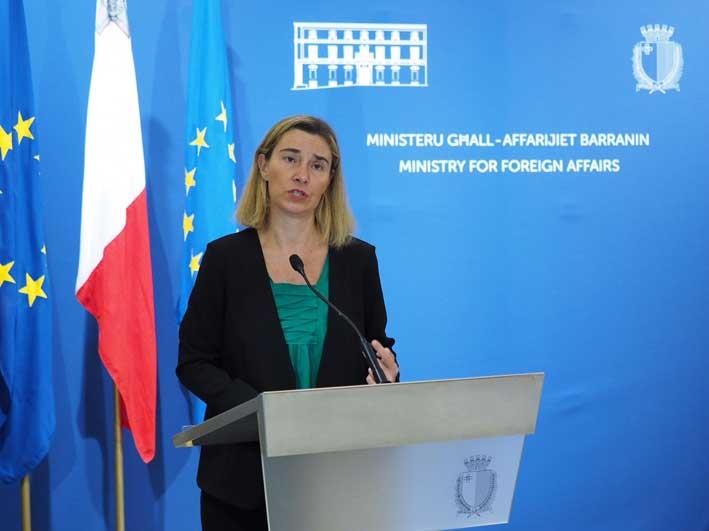The Maltese government did not take instructions from any country to refuse permission for a Soviet tanker on its way to Syria to refuel in Malta, Foreign Minister George Vella said today, stating that Malta took this decision on its own.
International and local media reported last week that the government initially gave permission to a Russian military replenishment fuel tanker to berth and refuel in Malta on its way to Syria, but then withdrew the permit following American and British pressure.
A note verbal issued on 20 October and published by the media shows that the government had given diplomatic clearance to the RFS Dubna to enter Malta between 4 and 6 November, but later withdrew the permission.
Addressing the media this morning in the presence of EU commissioner for foreign affairs Federica Mogherini, Dr Vella said Malta did not want to be part of a "war machine".
But he insisted that this does not necessarily mean that Malta will not allow Russian vessels - not warships - to refuel in Malta should they request to do so in the future.

"Contrary to reports, there was no country that told Malta what to do. We are wise enough not to be part of any country going into Syria to perpetrate the atrocities that are happening there". He also said that the decision was driven by the humanitarian wish not to see the situation in Syria worsen
"The decision not to refuel the Russian fleet in the Mediterranean was simply taken on our own responsibility, fully conscious of our Constitutional constraints".
For her part, Commissioner Mogherini said that there was no EU directive instructing member states not to support the Russian war vessel.
During the meeting with Foreign Affairs Minister George Vella, the two discussed a number of important topics, including migration, security, the unification of Cyprus, and the Mediterranean. During the meeting, the two shares their ideas as to the objectives of Malta's Presidency.
"When we saw that this flotilla was heading towards Syria, we decided not to be a part of this war machine".
During the press conference, the minister and Commissioner also told the press about their discussion held earlier today. The Minister put a lot of emphasis on the link between the Mediterranean and Europe, and that the EU must realise that the Mediterranean is part and parcel of Europe, that EU security depends on the Mediterranean. He said that aside from problems, the region also offers many opportunities.

For her part, Federica Mogherini said that Malta is a bridge between the EU and Africa. She spoke of opportunities to work with Africa on partnerships, growth and migration. The Maltese Presidency will also be used to prepare for the next EU-Africa summit. Since taking up her post as EU Commissioner, she said, she has seen migration and Libya jump upwards in EU priorities, out of political choice and not because the situation was forced.
"I am sure the Maltese Presidency will help us face these challenges".
Asked by The Malta Independent how the EU plans to tackle the sheer number of migrant deaths in the Mediterranean, the EU Commissioner said that "the EU has established operations in the Mediterranean, and its first purpose is to dismantle human trafficking operations at sea and on land. We are in international waters". She said that some suspected smugglers have already been arrested, and this has already started to create disincentives. As you know this operation is also saving lives, and allowing others to do the same, she said.
As a human being, I felt deeply ashamed two or three years ago, when there were people dying in the Mediterranean and the EU as such was not present, and I feel proud with every single life we manage to save.
She said that what is happening in the Mediterranean is just the tip of the iceberg, as there are people dying in the desert and on the shores.
She also spoke of cooperation with countries of transit, like Niger, where the EU is now beginning to see results making it more difficult for human traffickers.

Photos by Michael Camilleri
Ms Mogherini later met Prime Minister Joseph Muscat at the Auberge de Castille. Dr Muscat referred to Malta’s upcoming 6-month presidency of the EU. “We look forward to hearing your views on what can be achieved during this period,” he said, adding that the government did not have any "delusions of grandeur.”
The PM said he looked forward to working with Ms Mogherini on the foreign affairs portfolio. He referred to the Syrian conflict and the situation in Libya. “It is of critical importance that Libya remains high on the EU agenda. We know how important it is for Libyans to know that the EU is giving them importance.”
The EU’s foreign policy chief said Malta has a big part to play in the process to bring reconciliation and security in Libya. She said the fact that Malta would be assuming the EU presidency just a year after the Valletta Summit showed that the country was well poised to take a role in bridging the two blocs. “I am sure yours will be an exciting presidency,” she said.

Federica Mogherini has confirmed that she will attend the Senior Officials’ Meeting that will be held in Malta on the 8th and the 9th of February 2017 to follow up on last November’s Valletta Summit on Migration.
At a bilateral meeting with Carmelo Abela, Minister for Home Affairs and National Security, at Fort St Elmo in Valletta on Wednesday 2nd November 2016, Ms Mogherini said the follow-up meeting is important to assess what has been achieved since the Summit and what remains to be done by both the EU’s Member States and their African partner countries. Minister Abela said the High Representative’s participation will send a strong message of EU commitment and unity, adding that preparations for the meeting are well underway.
The themes discussed during the meeting included the EU’s approach to migration, security and defence, as well as Malta’s role in missions and operations of the EU’s Common Security and Defence Policy.
Welcoming the first Progress Report on the Partnership Framework with Third Countries under the European Agenda on Migration, issued recently, Minister Abela said there have already been some encouraging results from the heightened engagement with the five priority African countries as well as with other relevant third countries over the past few months. “We believe it is vital to maintain this momentum and use the weeks ahead to achieve more concrete and tangible results in time for the EU Heads of State or Government’s next European Council meeting in December,” he remarked.
On Libya, the Minister said that Malta welcomes the ackowledgement, in that Progress Report, of the pivotal role of Libya in the migratory flows along the central Mediterranean route. Expressing Malta’s belief that the EU should increase its engagement in Libya, he reiterated the island’s commitment to support further EU efforts to train the Libyan Coastguard, as part of its anti-migrant smuggling Operation Sophia.
On EU-NATO cooperation, he said that while Malta recognises the significance of these relations in the light of threats that call for synergies arising from shared geopolitical interests, it stresses the importance of respect for the autonomy and different purposes of the two organisations.